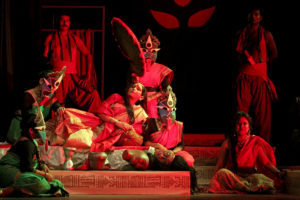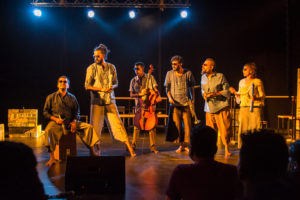Philippe Pelen Baldini’s Play: Vast
Playwright & Director: Phillippe Pelen Baldini
Group: Surya Performance Lab, Auroville (T.N.)
Language: English
Duration: 1 hr
The Play
This is the story of a young boy from Nepal who has been abducted and taken away from his family and home in the Himalayan Mountains. Kidnapped and abused, he now lives in a slum in a big city in India. He is all alone in the world, living stifled in his small room. He tries, day after day, to find in his body a door that opens to the ‘Vast’, a path to his Himalaya, and his own limitless nature, beyond confinement and misery. An encounter with a strange character helps him on his journey. This is the god Hanuman, with monkey and human features, heroic, wise, and full of humour.
Vast is an organic, physical and dance based performance that is hypnotic, emotional and universal. It showcases how the human body carries in itself the memory of the ‘Vast’. How the human body – beyond ruptures, oppression and confinements – has the nostalgia of nature and vastness.
Director’s Note
For the young boy whose childhood and dreams were shattered, the journey from confinement to freedom is a process of reconnection with nature and with himself, without any limitation. In this journey he is helped by Hanuman. Together they reconnect with the ‘Vastness’ they both come from. Hanuman is introduced here as a special character, the symbol of primordial memory. The play proposes a work on the memory of the body.
We are also exploring the relationship between body and the mother-tongue, between body and the ancient mantric poetry, between body and words. We draw upon contemporary dance, theatre, vocal work, and even aerial dance to explore this inner territory between confinement and Vastness. From gravity to weightlessness, it is also an exploration of the body being free in three dimensions, and of its expansion into Vastness.
The Director & Playwright
Born in France, Phillippe Pelen Baldini is the founder of Surya Performance Lab in India. He had earlier founded the International Talipot Theatre in Reunion Island, France. He has created and directed 40 shows with dancers, actors, musicians, and video creators from Africa, India, Europe and territories in the Indian Ocean. His productions have been welcomed at Opera de Paris, Théâtre de la Ville de Paris and well-known festivals in Honk Kong, Singapore, Italy, Brazil and South Africa. He has toured and worked in 82 countries. His shows have received awards in Poland, Scotland, France, Italy and South Africa, among other countries. He also directs workshops worldwide with professional dance companies, universities, townships and communities. He is interested in indigenous culture and has worked a lot with people from different ethnic groups in South Africa including the San communities as well as other different communities.
The Group
Surya Performance Lab is a dance-theatre company based in Auroville, India. In its 50-year long history it has worked with devoted artists and has performed in more than 82 countries. This professional company is directed by Philippe Pelen Baldini and Thierry Moucazambo. The group welcomes dancers, actors, photographers, video designers, painters, etc. from India and all over the world. Surya Performance Lab endeavours to create a bridge between art, science and consciousness. Inspired by the ‘First people’, indigenous cultures, ancient traditions, new discoveries in the field of body-mind consciousness and quantum science, it creates a contemporary expression and art, a new dramaturgy holistic and humanist, open to nature and the planet.
Cast & Credits
Performers Thierry Moucazambo, Gopal Dalami
Light Technician Ashwin Ezhumalai
Assistant Director Thierry Moucazambo
Director and Choreographer Philippe Pelen Baldini
Contacts
Director, Surya Performance Lab
E-4, Sunship Apartments, Auroville, Bommayapalayam,
Tamil Nadu, Auroville, Tamil Nadu 605101
M: +91 8903869078
E: suryaperformancelab@auroville.org.in

